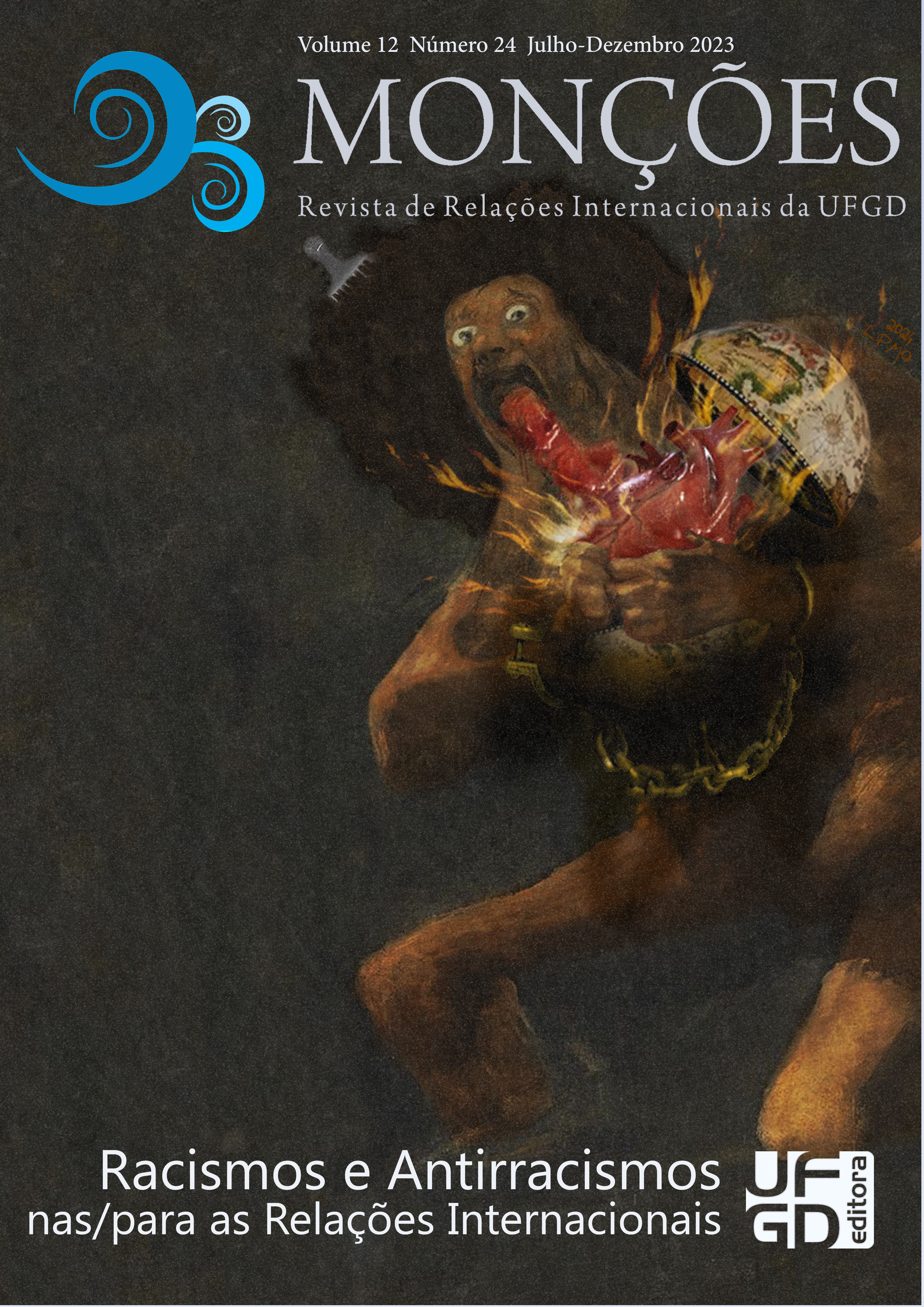Routes, Roots and International Relations: (Re)Learning from the Diaspora(s)
DOI:
https://doi.org/10.30612/rmufgd.v12i24.16526Keywords:
Routes, Roots, DiasporasAbstract
This article aims to understand different ways of thinking about modernity/ies. Instead of thinking through the fixity of their concepts and understandings, which lead to a totalizing and universalizing look at the modern subject, the modern State (characterized by sovereignty) and the modern international, I seek to understand how the theorization of modernity and the international starting from the movement make us contest the perspectivism of an absolute truth. It therefore brings different perspectives of truth. The movement here is based on theorizations through the routes and roots that characterize the diasporic and Atlantic perspectives as a way of (re)visiting multiple resistances. The routes and roots that run through the Atlantic(s) incorporate the movement as a place of production of political life. Therefore, I bring decoloniality as a project in constant (re)making that enables the cultivation and multiplication of imaginaries that are constituted not “despite of” but “through” difference. This movement allows us to sow different ways of being and knowing that were and still are a crucial point of rupture within the field of International Relations. Their assertions of cultural practices and the connections they create challenge and subvert the static order, making us question where (else) con we look for politics?
Downloads
References
ANZALDÚA, Gloria. Borderlands/La frontera: la nueva mestiza. Capitán Swing Libros, 2007.
BERNARDINO-COSTA, Joaze. “Decolonialidade, Atlântico Negro e Intelectuais negros brasileiros”. Sociedade e Estado, vol.33, n.1, 2018, pp.117-135. DOI: https://doi.org/10.1590/s0102-699220183301005
CLIFFORD, James. Routes: Travel and translation in the late twentieth century. Harvard University Press, 1997.
COSTA, Sérgio. Dois Atlânticos: teoria social, anti-racismo, cosmopolitismo. editora UFMG, 2006.
GILROY, Paul. O Atlântico Negro. Modernidade e dupla consciência. São Paulo: Editora 34, 2001.
______. Postcolonial Melancholia. New York: Columbia University Press, 2005.
GROVOGUI, Siba. “Regimes of Sovereignty: Rethinking International Morality and the African Condition,” The European Journal of International Relations, vol. 8, no.3 (2002), 315-38. DOI: https://doi.org/10.1177/1354066102008003001
HALL, Stuart. The Fateful Triangle. Race, Ethnicity, Nation. Cambridge: Harvard University Press, 2017. DOI: https://doi.org/10.4159/9780674982260
HUYSMANS, Jeff; NOGUEIRA, João Pontes. 'Ten years of IPS: fracturing IR', International Political Sociology, 10 (2016), pp. 299-319. DOI: https://doi.org/10.1093/ips/olw025
INAYATULLAH, Naeem; BLANEY, David L. International relations and the problem of difference. Routledge, 2004. DOI: https://doi.org/10.4324/9780203644096
LAGE, Victor. O Atlântico Vermelho: modernidade e marcadores de discriminação. 2021. Disponível em: https://errante.blog/2021/08/12/o-atlantico-vermelho-modernidade-e-marcadores-de-discriminacao-por-victor-coutinho-lage/#_edn2. Acesso em: 23 de janeiro de 2022.
DOS SANTOS FILHO, Onofre. Ultra Aequinoxialem Non Peccari: anarquia, estado de natureza e a construção da ordem político-espacial. Monções: Revista de Relações Internacionais da UFGD, v. 8, n. 15, p. 486-518, 2019. DOI: https://doi.org/10.30612/rmufgd.v8i15.11553
PAULINO, Rosana. Atlântico Vermelho. Exposição, 2017.
SHILLIAM, Robbie. The Black Pacific: Anti-colonial struggles and oceanic connections. Londres: Bloomsbury Publishing. 2015. DOI: https://doi.org/10.5040/9781474218788
SPIVAK, Gayatri Chakravorty. Pode o subalterno falar. UFMG, 2003.
TROUILLOT, Michel-Rolph. “North Atlantic Universals: Analytical Fictions, 1492–1945”. The South Atlantic Quarterly, vol.101, n.4, 2002, pp.839-858. DOI: https://doi.org/10.1215/00382876-101-4-839
WALKER, R. B. J. Inside⁄Outside: International Relations as Political Theory. Cambridge: Cambridge University Press, 1993. DOI: https://doi.org/10.1017/CBO9780511559150
WALKER, R. B. J. After the globe, before the world, Global horizons. London ; New York: Routledge, 2006.
Downloads
Published
How to Cite
Issue
Section
License
- Os autores e autoras mantêm os direitos autorais e concedem à revista o direito de primeira publicação, com o trabalho simultaneamente licenciado sob a Creative Commons Atribuição-NãoComercial-CompartilhaIgual 3.0 Brasil. que permite o compartilhamento do trabalho com reconhecimento da autoria e publicação inicial nesta revista.
- Autores e autoras têm autorização para assumir contratos adicionais separadamente, para distribuição não-exclusiva da versão do trabalho publicada nesta revista (ex.: publicar em repositório institucional ou como capítulo de livro), com reconhecimento de autoria e publicação inicial nesta revista.
- Autores e autoras têm permissão e são estimulados a publicar e distribuir seu trabalho online (ex.: em repositórios institucionais ou na sua página pessoal) a qualquer ponto antes ou durante o processo editorial, já que isso pode gerar alterações produtivas, bem como aumentar o impacto e a citação do trabalho publicado, porém invariavelmente com o reconhecimento de autoria e publicação inicial nesta revista.


